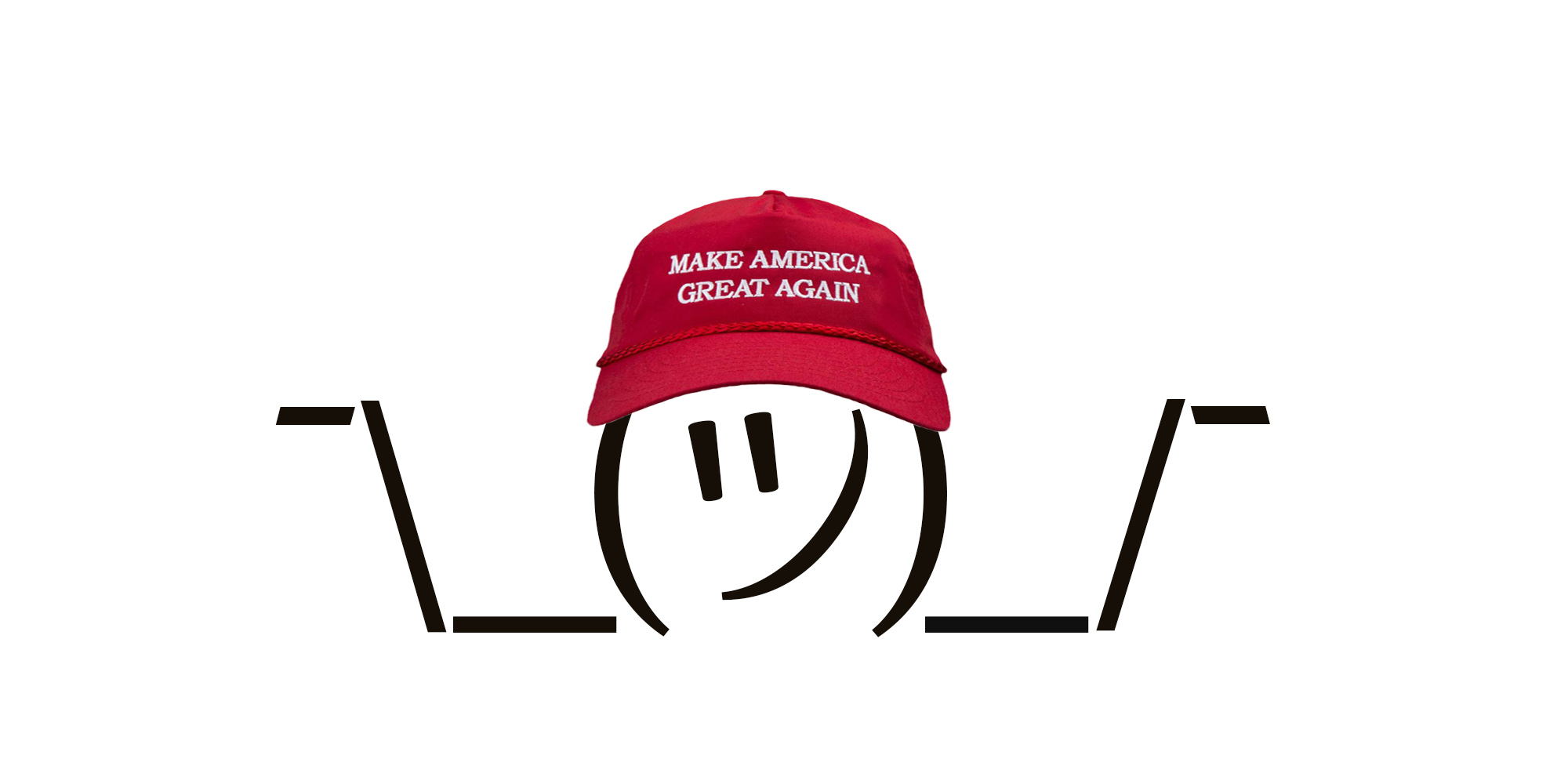Prince Georging, Meflection, and Gobbing: A brief guide to Trump's rhetorical tricks
You have to slow down and name what Trump is doing instead of reacting to it. Otherwise it might work on you.


A free daily email with the biggest news stories of the day – and the best features from TheWeek.com
You are now subscribed
Your newsletter sign-up was successful
The first debate between Hillary Clinton and Donald Trump arrives at a moment in the election season when we've almost stopped believing in words at all. This is Trump's gift to America.
Trump contradicts himself, strips his campaign of coherence, and spins this as a strength. He has refined misdirection into a potent political strategy. As but one example: Trump said Obama founded ISIS, then clarified later that he was being sarcastic. Well, "not that sarcastic," he specified later still. His spokespeople sowed more confusion by saying Trump didn't mean what he said. Or maybe he did. As Katrina Pierson put it, "He hasn't changed his position on immigration. He's changed the words that he is saying."
Keep up, America.
The Week
Escape your echo chamber. Get the facts behind the news, plus analysis from multiple perspectives.

Sign up for The Week's Free Newsletters
From our morning news briefing to a weekly Good News Newsletter, get the best of The Week delivered directly to your inbox.
From our morning news briefing to a weekly Good News Newsletter, get the best of The Week delivered directly to your inbox.
Jay Rosen has made an excellent case that the press needs a radical new approach to dealing with the Trump phenomenon. So does the public, frankly, so I'm proposing one here: Let's start developing a vocabulary for what he does. We've had plenty of time and several seasons of The Apprentice to study this curious man. Let's name the moves he makes.
In the meantime, stop letting the misdirection work. Press pause on all the pre-written scripts we have for these debates. Those scripts have Clinton as the competent and experienced party and Trump as the buffoon. That's a narrative that will automatically generate headlines that say "Trump performed surprisingly well! He's looking downright presidential up there!" This is because Trump is not an ape, and this narrative sets expectations so low they practically guarantee him a false victory.
This is key: You have to slow down and name what Trump is doing instead of reacting to it. Otherwise it might work on you.
Consider terms like "gaslighting," "mansplaining," and "negging." These are words that anatomized and labeled dumb dominance behaviors whose social effects aren't dumb — they're real. Naming this sort of thing teaches others (especially those not subject to the behaviors in question) to think twice about how our perceptions are tweaked by social cues and how animalistically we're programmed. If someone calls someone else weak and they don't challenge it, the lizard brain's first impulse is not to say, "Well, of course, it's unreasonable to expect someone to respond to such an uncivil charge." It is to say, "HUH! GUESS HE IS WEAK." If a man talks over someone else for long enough and the other party doesn't manage to stop it, this person must not be worth listening to. This is what happened to Jeb Bush. We only barely get control over these impulses by making our psychological vulnerabilities visible; that is, by naming them.
A free daily email with the biggest news stories of the day – and the best features from TheWeek.com
"Negging" — essentially, an insult or backhanded compliment that lowers the target's self-esteem in a manner meant to make the insulted person want to win over the insulter — is an especially instructive example because the phenomenon was technically named and described by the people using it, the pick-up artists. But the source didn't matter; naming the technique is what strips it of its power. A magic trick stops working the instant you see how it's done, and having a label for negging helped us really understand the underlying psychological manipulation at work there: Make women feel smaller so they'll default to their saddest social programming and try for your approval.
In the hours leading up to the debate, let's do the same for Trump's behaviors: Name them so people have a shorthand for how they work. Many of them aren't even verbal, they're visual. Take his "I've been a bad boy" performance, the objective of which is getting everyone to laugh at what a scamp he is. Fast forward to 28:10, and watch how he mugs like a little kid while asked about his "extraordinarily ugly" remarks about Mexicans and shrugs them off.
This is effective. It works on the crowd.
Let's call it Prince Georging.
Prince Georging is mugging like you're an adorable little cherub who can charm people with how bad you've been. Sure, it's a bit grotesque coming from a 70-year-old man, but that's the strategy. Here's another example from his speech at the Republican National Convention. Trump says "nobody knows the system better than me," and looks into the camera with a little-boy smirk, waiting for his viewers to catch up to what he's saying — that he's been bribing politicians all his life. "Which is why I alone can fix it," he concludes.
Prince Georging — that is, neutralizing extremely serious charges by playing to cultural tolerance for boys-will-be-boys puerility — needs a name because otherwise we're uniquely vulnerable to it. It's one of those subterranean get-out-of-jail-free programs we don't realize we still have in reserve for (sometimes elderly) criminal children. (Note how unavailable that move is to Clinton: There is no "girls-will-be-girls" script that will earn her that exculpatory laugh.)
There are other strategies, of course. Take Trump's habit of addressing any question or circumstance, like the shooting death of Dwyane Wade's sister Nykea Aldridge, by saying how much someone or some group likes him. (His response to that incident: "Just what I have been saying. African-Americans will VOTE TRUMP!") Asked about his statement that Mexicans are rapists, he replied, "Mexicans love me."
Let's call this Meflection: a Trumpian portmanteau of deflection and narcissistic reflection. It's a move that has no content, and while it's often offered after a question is asked, it should not be accepted as a response. Trying to substitute self-praise for a health-care plan is not a conversational move. It is an evasive maneuver. It is a feint.
Then there's Gobbing. When Ted Cruz asked Trump about his health care plan in one of the primary debates, Trump replied, "We are going to take those people, and those people are going to be serviced by doctors and hospitals. We're gonna make great deals on it, but we're not gonna let people die in the street." "Call it what you want, people are not going to be dying in the streets," he repeated, implying that under Cruz, they will.
This is a move Arrested Development fans will recognize from Gob's aggressive ad campaign against Michael's frozen banana stand. "A Frozen Banana That Won't Make You Sick And Kill You!"

These maneuvers are signs of weakness masked as strength. Because reality TV is about activating society's ugliest, simplest, secret scripts, Trump is brilliant at inviting viewers to default to them. There's a lot of subconscious American programming for Trump to play to here, and it's up to the electorate to articulate and name the moves that Trump tries to trap us into. People who have been watching reality TV forever: This is your moment to shine. Have you watched Celebrity Apprentice? Name Trump's moves.
Lili Loofbourow is the culture critic at TheWeek.com. She's also a special correspondent for the Los Angeles Review of Books and an editor for Beyond Criticism, a Bloomsbury Academic series dedicated to formally experimental criticism. Her writing has appeared in a variety of venues including The Guardian, Salon, The New York Times Magazine, The New Republic, and Slate.
-
 The ‘ravenous’ demand for Cornish minerals
The ‘ravenous’ demand for Cornish mineralsUnder the Radar Growing need for critical minerals to power tech has intensified ‘appetite’ for lithium, which could be a ‘huge boon’ for local economy
-
 Why are election experts taking Trump’s midterm threats seriously?
Why are election experts taking Trump’s midterm threats seriously?IN THE SPOTLIGHT As the president muses about polling place deployments and a centralized electoral system aimed at one-party control, lawmakers are taking this administration at its word
-
 ‘Restaurateurs have become millionaires’
‘Restaurateurs have become millionaires’Instant Opinion Opinion, comment and editorials of the day
-
 The billionaires’ wealth tax: a catastrophe for California?
The billionaires’ wealth tax: a catastrophe for California?Talking Point Peter Thiel and Larry Page preparing to change state residency
-
 Bari Weiss’ ‘60 Minutes’ scandal is about more than one report
Bari Weiss’ ‘60 Minutes’ scandal is about more than one reportIN THE SPOTLIGHT By blocking an approved segment on a controversial prison holding US deportees in El Salvador, the editor-in-chief of CBS News has become the main story
-
 Has Zohran Mamdani shown the Democrats how to win again?
Has Zohran Mamdani shown the Democrats how to win again?Today’s Big Question New York City mayoral election touted as victory for left-wing populists but moderate centrist wins elsewhere present more complex path for Democratic Party
-
 Millions turn out for anti-Trump ‘No Kings’ rallies
Millions turn out for anti-Trump ‘No Kings’ ralliesSpeed Read An estimated 7 million people participated, 2 million more than at the first ‘No Kings’ protest in June
-
 Ghislaine Maxwell: angling for a Trump pardon
Ghislaine Maxwell: angling for a Trump pardonTalking Point Convicted sex trafficker's testimony could shed new light on president's links to Jeffrey Epstein
-
 The last words and final moments of 40 presidents
The last words and final moments of 40 presidentsThe Explainer Some are eloquent quotes worthy of the holders of the highest office in the nation, and others... aren't
-
 The JFK files: the truth at last?
The JFK files: the truth at last?In The Spotlight More than 64,000 previously classified documents relating the 1963 assassination of John F. Kennedy have been released by the Trump administration
-
 'Seriously, not literally': how should the world take Donald Trump?
'Seriously, not literally': how should the world take Donald Trump?Today's big question White House rhetoric and reality look likely to become increasingly blurred
